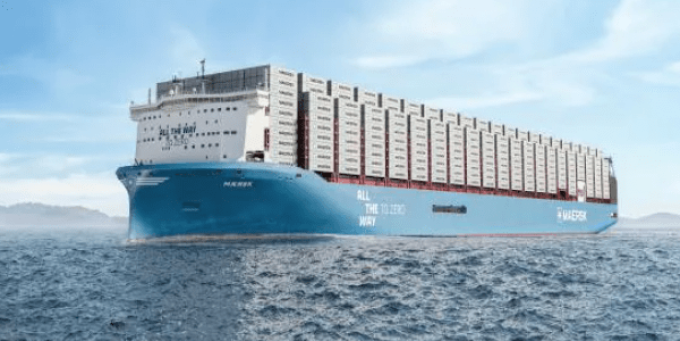Emirates airline and Iceland join Move to -15C Coalition
Emirates and UK supermarket Iceland have become the latest members of the Move to -15C ...
BA: WIND OF CHANGEMAERSK: BULLISH CALLXPO: HEDGE FUNDS ENGINEF: CHOPPING BOARDWTC: NEW RECORDZIM: BALANCE SHEET IN CHECKZIM: SURGING TGT: INVENTORY WATCHTGT: BIG EARNINGS MISSWMT: GENERAL MERCHANDISEWMT: AUTOMATIONWMT: MARGINS AND INVENTORYWMT: ECOMM LOSSESWMT: ECOMM BOOMWMT: RESILIENCEWMT: INVENTORY WATCH
BA: WIND OF CHANGEMAERSK: BULLISH CALLXPO: HEDGE FUNDS ENGINEF: CHOPPING BOARDWTC: NEW RECORDZIM: BALANCE SHEET IN CHECKZIM: SURGING TGT: INVENTORY WATCHTGT: BIG EARNINGS MISSWMT: GENERAL MERCHANDISEWMT: AUTOMATIONWMT: MARGINS AND INVENTORYWMT: ECOMM LOSSESWMT: ECOMM BOOMWMT: RESILIENCEWMT: INVENTORY WATCH

Maersk has expounded on its apparent u-turn on LNG, which gave the industry pause after criticism of the fuel from company executives.
Despite telling The Loadstar in 2023 that LNG was “not a fuel of the future for our fleet” and it would “invest in technologies and innovation that can develop new green alternatives to fossil fuel”, Maersk surprised the industry again by appearing to u-turn on this claim, ordering and chartering-in LNG-fuelled vessels.
Now, a Maersk spokesperson told The Loadstar this morning: “Our overall position on LNG has not changed; LNG is a fossil fuel and is not a lever for decarbonising shipping,” and that bio-methane, instead, would be a major part of its new strategy.
A carbon-neutral version of LNG, manufactured using methane emitted by anaerobic digestion of organic matter, bio-methane (or bio-LNG in its cryogenic form) is ‘biogenic’, meaning some amount would be emitted to the atmosphere as methane, regardless of human activity.
“We now consider bio-methane to be a viable fuel pathway contributing to the transition… we we see promising developments for availability of liquified bio-methane, though its full scaling abilities are yet to be met. Future large-scale bio-methanol is predominantly produced from dry feedstocks. These feedstocks are of course all limited in supply and scale, but we still see significant scaling potential of both pathways.”
Identifying biogenic sources of methane and burning this as fuel has some enticing benefits, chief among them, transforming an existing emission of methane and transforming it, via combustion, into CO2, a less-potent greenhouse gas.
A 2016 EU study implies that some bio-methane could be made available in Europe. Considering four scenarios for biogas adoption, production reached 40,000 ktoe in the most aggressive scenario, providing almost, but not quite, enough for ship bunkering needs throughout Europe.
Biogas supply is necessarily limited, similarly to the biogenic feedstock of green methanol, to what can be found and harnessed. Nations are already scaling biogas plant capability to reclaim as much useful feedstock from sewage and agricultural waste.
The Maersk spokesperson declined to reveal what new evidence had emerged that bio-methane – a fuel refined from limited feedstock – would be in sufficient supply to power the fleet of LNG-fuelled vessels, but added: “We see demand signals clearly driving new supply and by this order and by engaging further in the biomethane market, we expect the same scaling effect in the market.”
As to the familiar worry for vessels using methane as fuel, the spokesperson clarified: “There has been a lot of progress on limiting methane slip, both upstream and downstream, on the vessels. Vessels can now be designed for a considerably lower methane slip footprint. We will only order the high-pressure low-slip main engines to limit the methane slip.”
Comment on this article